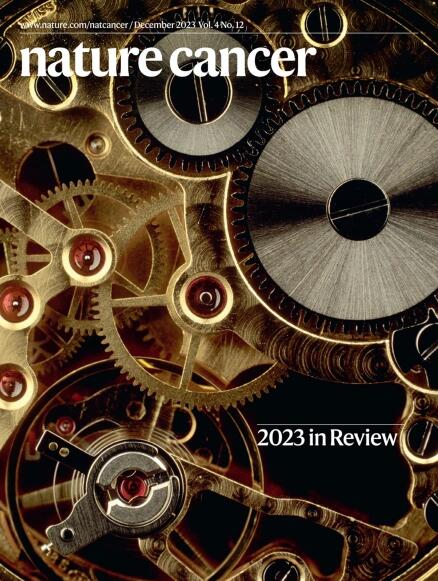通过结肠器官组织模拟从单个 MLH1 基因敲除细胞开始的腺瘤-癌变过程。
IF 23.5
1区 医学
Q1 ONCOLOGY
引用次数: 0
摘要
从单个mlh1敲除的人结肠细胞开始,我们通过顺序选择自发获得突变的细胞,模拟了子细胞和由此产生的类器官从正常上皮向癌的转变。这些突变常见于具有高微卫星不稳定性的Lynch综合征相关结直肠癌患者,并诱导对限制成体干细胞生长的生长因子不敏感。本文章由计算机程序翻译,如有差异,请以英文原文为准。

Modeling adenoma–carcinoma progression from a single MLH1-knockout cell via colon organoids
Starting from a single MLH1-knockout human colon cell, we modeled the transition of daughter cells and resultant organoids from normal epithelium to carcinoma by sequentially selecting cells with spontaneously acquired mutations. The mutations were those common in patients who have Lynch syndrome-associated colorectal cancer with high microsatellite instability, and induced insensitivity to growth factors that restrict the growth of adult stem cells.
求助全文
通过发布文献求助,成功后即可免费获取论文全文。
去求助
来源期刊

Nature cancer
Medicine-Oncology
CiteScore
31.10
自引率
1.80%
发文量
129
期刊介绍:
Cancer is a devastating disease responsible for millions of deaths worldwide. However, many of these deaths could be prevented with improved prevention and treatment strategies. To achieve this, it is crucial to focus on accurate diagnosis, effective treatment methods, and understanding the socioeconomic factors that influence cancer rates.
Nature Cancer aims to serve as a unique platform for sharing the latest advancements in cancer research across various scientific fields, encompassing life sciences, physical sciences, applied sciences, and social sciences. The journal is particularly interested in fundamental research that enhances our understanding of tumor development and progression, as well as research that translates this knowledge into clinical applications through innovative diagnostic and therapeutic approaches. Additionally, Nature Cancer welcomes clinical studies that inform cancer diagnosis, treatment, and prevention, along with contributions exploring the societal impact of cancer on a global scale.
In addition to publishing original research, Nature Cancer will feature Comments, Reviews, News & Views, Features, and Correspondence that hold significant value for the diverse field of cancer research.
 求助内容:
求助内容: 应助结果提醒方式:
应助结果提醒方式:


